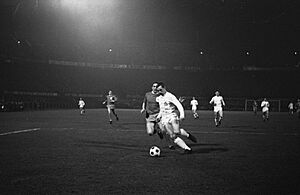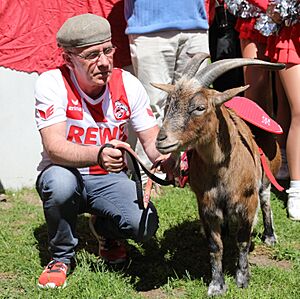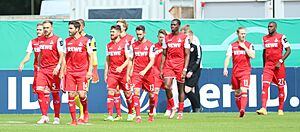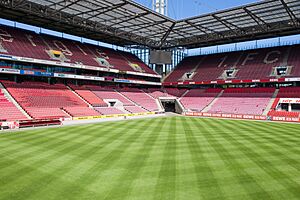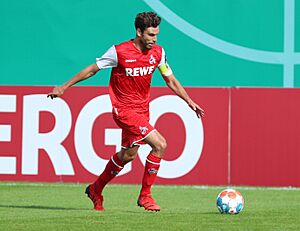1. FC Köln facts for kids
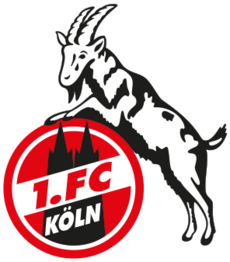 |
||||
| Full name | 1. Fußball-Club Köln 01/07 e. V. | |||
|---|---|---|---|---|
| Nickname(s) | Die Geißböcke (The Billy Goats) Effzeh |
|||
| Founded | 13 February 1948 | |||
| Ground | RheinEnergieStadion | |||
| Capacity | 49,698 | |||
| President | Werner Wolf | |||
| Head coach | Lukas Kwasniok | |||
| League | Bundesliga | |||
| 2020–21 | Bundesliga, 16th of 18 | |||
|
||||
1. FC Köln, also known as FC Cologne in English, is a professional football club from Cologne, Germany. It was created in 1948 when two older clubs, Kölner Ballspiel-Club 1901 and SpVgg Sülz 07, joined together.
The team plays in the Bundesliga, which is Germany's top football league. They earned promotion by winning the 2024–25 2. Bundesliga season. 1. FC Köln has won the national championship three times. They won the German football championship in 1962 and the Bundesliga twice, in 1963–64 and 1977–78. Their home games are played at the RheinEnergieStadion.
The club's fun nickname is Die Geißböcke, which means "The Billy Goats". This name comes from their mascot, a real goat named Hennes. The first Hennes was a gift from a circus owner. The current mascot is Hennes IX. Another local nickname for the club is FC or Effzeh. The team wears white and red for their home games.
1. FC Köln has a big rivalry with Borussia Mönchengladbach, called the Rhine derby. They also have rivalries with Fortuna Düsseldorf and Bayer Leverkusen. Like many German clubs, 1. FC Köln is part of a larger sports club with teams in other sports like handball and table tennis. The club has over 150,000 members, making it one of the biggest in Germany.
Contents
Club History
How the Club Started
Before 1. FC Köln was formed, there were two main clubs. Kölner BC started in 1901. They were good at football and even reached the national finals in 1912.
The other club was Spielvereinigung 1907 Köln-Sülz, which began in 1907. They also won a regional title in 1928. These two clubs eventually merged in 1948 to create 1. FC Köln.
Early Successes
After the merger, 1. FC Köln quickly became successful. They won their first regional championship in 1953–54. In 1962, they won their first national championship, beating 1. FC Nürnberg 4–0. This win allowed them to play in the European Cup.
In 1963, 1. FC Köln became one of the first 16 teams in the new Bundesliga. This was Germany's new professional football league. Köln made history by becoming the very first Bundesliga champion in the 1963–64 season.
More Trophies and European Games
1. FC Köln continued to do well. They finished second in the Bundesliga in 1964–65. They also won their first DFB-Pokal (German Cup) in 1967–68.
The 1970s were a strong period for the club. They reached the DFB-Pokal final several times, winning it in 1977. Their most successful season was 1977–78, when they won both the Bundesliga title and the DFB-Pokal. This is known as "the double."
In 1986, Köln reached their first European final, the UEFA Cup. They played against Real Madrid but lost. The club continued to perform well in the Bundesliga, finishing second in 1989 and 1990.
Challenges and Comebacks
After many successful years, 1. FC Köln faced some tough times in the 1990s. In 1998, they were relegated from the Bundesliga for the first time. This meant they had to play in a lower league. For a while, they became a "yo-yo team," moving between the first and second divisions.
In 2012, the club had financial problems and was relegated again. However, new leaders and coaches helped turn things around. They worked hard to improve the team and the club's finances.
In the 2013–14 season, Köln won the 2. Bundesliga and were promoted back to the top division. They continued to improve, finishing fifth in the Bundesliga in 2016–17. This allowed them to play in the 2017–18 UEFA Europa League, their first European competition in 25 years.
Recent Years
After returning to Europe, the team had a difficult 2017–18 season and was relegated again. They earned promotion back to the Bundesliga in 2019.
In 2023, the club faced a transfer ban from FIFA due to a player signing issue. This meant they couldn't sign new players for a period. In the 2023–24 season, Köln was relegated to the 2. Bundesliga. However, they quickly bounced back, winning the 2. Bundesliga in the 2024–25 season and earning promotion back to the Bundesliga.
Home Stadium
1. FC Köln plays its home matches at the RheinEnergieStadion. It can hold about 50,000 fans. Most fans still call it the "Müngersdorfer Stadion," after the area where it is located.
The club also has its own training center called Geißbockheim, located in Sülz. This center includes the Franz-Kremer-Stadion, where the club's second team plays.
Club Achievements
National Titles
- Bundesliga
- Champions: 1963–64, 1977–78
- German football championship
- Winners: 1961–62
- DFB-Pokal (German Cup)
- Winners: 1967–68, 1976–77, 1977–78, 1982–83
- 2. Bundesliga
- Winners: 1999–2000, 2004–05, 2013–14, 2018–19, 2024–25
International Competitions
- UEFA Cup
- Runners-up: 1985–86
Regional Titles
- Oberliga West
- Winners: 1953–54, 1959–60, 1960–61, 1961–62, 1962–63
Youth Team Successes
- German Under 19 championship
- Champions: 1970–71, 2024–25
- Under 19 Bundesliga Division West
- Champions: 2007–08
- Under 19 Juniors DFB-Pokal
- Champions: 2012–13
- German Under 17 championship
- Champions: 1989–90, 2010–11, 2018–19
- Under 17 Bundesliga Division West
- Champions: 2010–11, 2011–12, 2018–19
Team Kits
Köln's kits are currently made by Hummel International. The club has had different kit manufacturers and shirt sponsors over the years.
| Years | Kit manufacturer | Shirt sponsor |
|---|---|---|
| 1979–82 | Adidas | Pioneer |
| 1982–85 | Doppel Dusch | |
| 1985–88 | Puma | Daimon |
| 1988–91 | Samsung | |
| 1991–93 | Citibank | |
| 1993–94 | Pepsi | |
| 1994–99 | Ford | |
| 1999–01 | VPV Versicherungen | |
| 2001–03 | Saller | |
| 2003–05 | Funny-Frisch | |
| 2005–07 | Adidas | Gerling |
| 2007–08 | REWE Group | |
| 2008–12 | Reebok | |
| 2012–18 | Erima | |
| 2018–22 | Uhlsport | |
| 2022– | Hummel |
Club Rivals
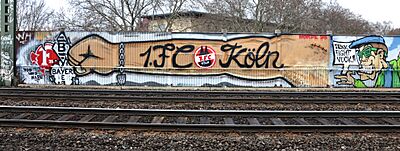
1. FC Köln has a strong rivalry with Borussia Mönchengladbach. Their matches are known as the Rhine derby. Even though Mönchengladbach is not directly on the Rhine River, both clubs are in the Rhineland region. Köln also has rivalries with two other clubs from the Rhineland: Fortuna Düsseldorf and Bayer Leverkusen.
Current Players
|
|
Players on Loan
|
|
Coaching Staff
Women's Team
1. FC Köln also has a women's football team. They were promoted to the top women's league, the Frauen-Bundesliga, in 2015. They were relegated in 2017 but quickly earned promotion back to the Bundesliga in the same year.
See also
 In Spanish: F. C. Colonia para niños
In Spanish: F. C. Colonia para niños
 | Audre Lorde |
 | John Berry Meachum |
 | Ferdinand Lee Barnett |




